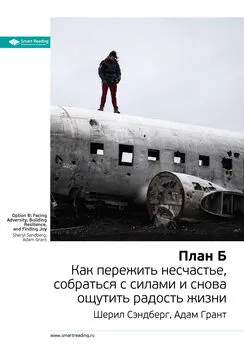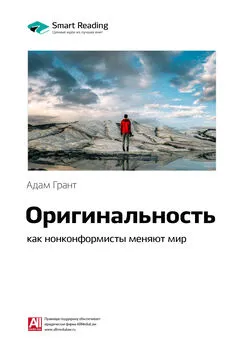Адам Грант - Оригиналы
- Название:Оригиналы
- Автор:
- Жанр:
- Издательство:ACT, CORPUS
- Год:2019
- ISBN:978-5-17-097449-8
- Рейтинг:
- Избранное:Добавить в избранное
-
Отзывы:
-
Ваша оценка:
Адам Грант - Оригиналы краткое содержание
Оригиналы - читать онлайн бесплатно полную версию (весь текст целиком)
Интервал:
Закладка:
6 James N. Baron and Michael T. Hannan. Organizational Blueprints for Success in High-Tech Startups: Fes sons from the Stanford Project on Emerging Companies // California Management Review44 (2002): 8-36; Michael T. Hannan, James N. Baron, Greta Hsu, and Ozgecan Kocak. Organizational Identities and the Hazard of Change 11 Industrial and Corporate Change 15 (2006): 755–784.
7 Marshall Goldsmith. What Got You Here Wont Get You There: How Successful People Become Even More Successful. New York: Ha-chette, 2007.
8 Edgar H. Schein. Organizational Culture. San Francisco: Jossey-Bass, 1992; Benjamin Schneider. The People Make the Place Ц Personnel Psychology 40 (1987): 437–453; Benjamin Schneider, D. Brent Smith, and Harold W. Goldstein. Attraction-Selection Attrition: Toward a Person-Environment Psychology of Organizations , in Person Environment Psychology: Models and Perspectives (2000): 61–85.
9 Jesper Sorensen. The Strength of Corporate Culture and the Reliability of Firm Performance 11 Administrative Science Quarterly 47 (2002): 70–91.
10 Michael L. McDonald and James D. Westphal. Getting By with the Advice of Their Friends: CEOs' Advice Networks and Firms' Strategic Responses to Poor Performance 11 Administrative Science Quarterly 48 (2003): 1-32.
11 Charlan J. Nemeth. Differential Contributions of Majority and Minority Influence 11 Psychological Review 93 (1986): 23–32; Stefan Schulz-Hardt, Felix C. Brodbeck, Andreas Mo-jzisch, Rudolf Kerschreiter, and Dieter Frey. Group Decision Making in Hidden Profile Situations: Dissent as a Facilitator for Decision Quality // Journal of Personality and Social Psychology 91 (2006): 1080–1093.
12 Личные интервью автора с Заком Видером и Марком Кирби, 24 июня 2014; личные интервью автора с Заком Видером, 12 января, 9 и 16 февраля и 16 апреля 2015; личные интервью автора с Рэем Далио, 31 июля 2014 и 12 февраля 2015; и еще множество часов дополнительных бесед, наблюдений, видеозаписей и случаев, рассказанных нынешними и бывшими сотрудниками Bridgewater с июня 2014 по январь 2015; Ray Dalio. Principles , www.bwater.com/home/culture-principles, aspx; Robert Kegan, Fisa Fahey, Andy Fleming, and Matthew Miller. Making Business Personal // Harvard Business Review, April 2014, 45–52; Kevin Roose. Pursuing Self-Interest in Harmony with the Laws of the Universe and Contributingto Evolution Is Universally Rewarded // New York Magazine, April 10, 2001, http://nymag.com/news/busi-ness/wallstreet/ray-dalio-2011-4/; Jeffrey T. Polzer and Heidi K. Gardner. Bridgewater Associates // Harvard Business School Video Case, 413–702, May 2013, www.hbs.edu/faculty/Pages/item. aspx?num=44831.
13 Jack Handey, Saturday Night Live , 1991.
14 Charlan Jeanne Nemeth. Minority Influence Theory, in Handbook of Theories in Social Psychology 2 (2012): 362–378; Charlan Nemeth, Keith Brown, and John Rogers. DeviTs Advocate Versus Authentic Dissent: Stimulating Quantity and Quality // European Journal of Social Psychology 31 (2001): 707–720; личное общение с Чарлан Немет, 15 января 2015; Roger В. Porter. Presidential Decision Making: The Economic Policy Board. Cambridge: Cambridge University Press, 1980.
15 Stefan Schulz-Hardt, Marc Jochims, and Dieter Frey. Productive Conflict in Group Decision-Making: Genuine and Contrived Dissent as Strategies to Counteract Biased Information Seeking// Organizational Behavior and Human Decision Processes 88 (2002): 563–586.
16 Paul Saffo. Strong Opinions, Weakly Held, July 26, 2008, www.skmurphy.com/hlog/ 2010/ 08/ 16/paul-saffo-forecasting-is-strong-opinions-weakly-held/.
17 Jian Liang, Crystal I. C. Farh, and Jiing-Lih Farh. Psychological Antecedents of Promotive and Prohibitive Voice: A Two-Wave Examination // Academy of Management Journal 55 (2012): 71–92.
18 David A. Hofmann. Overcomingthe Obstacles to Cross-Functional Decision Making: Faying the Groundwork for Collaborative Problem Solving // Organizational Dynamics (2015); личные беседы с Дэвидом Хофманом и Джеффом Эдвардсом, март 2008.
19 Laszlo Воск. Work Rules! Insights from Google That Will Transform How You Live and Lead. New York: Twelve, 2015.
20 Цитируется в: Robert I. Sutton. IPs Up to You to Start a Good Fight // Harvard Business Review, August 3, 2010.
21 Личное интервью автора с Томом Джеррити, 12 июля 2011.
22 Zannie G. Voss, Daniel М. Cable, and Glenn В. Voss. Organizational Identity and Firm Performance: What Happens When Leaders Disagree About “Who We Are?” // Organization Science 17 (2006): 741-755-
23 Andrew Carton, Chad Murphy, and Jonathan Clark. A (Blurry) Vision of the Future: How Feader Rhetoric About Ultimate
Goals Influences Performance 11 Academy of Management Journal 57 (2014): 1544–1570.
24 Trish Reay, Whitney Berta, and Melanie Kazman Kohn. What’s the Evidence on Evidence- Based Management? // Academy of Management Perspectives (November 2009): 5-18.
Глава 8. Как раскачать лодку и как вернуть ей равновесие
1 Nelson Mandela. Long Walk to Freedom: The Autobiography of Nelson Mandela. New York: Little, Brown, 1995.
2 Личное интервью автора с Льюисом Пью, 10 июня 2014, и личная беседа, 15 февраля 2015; Lewis Pugh .Achieving the Impossible. London: Simon & Schuster, 2010 and 21 Yaks and a Speedo: How to Achieve Your Impossible. Johannesburg and Cape Town, South Africa: Jonathan Ball Publishers, 2013; “ Как я плыл к успеху ”, речь на Всемирном экономическом форуме в Давосе, Швейцария, 23 января 2014.
3 Adam М. Grant. Rocking the Boat But Keeping It Steady: The Role of Emotion Regulation in Employee Voice // Academy of Management Journal 56 (2013): 1703–1723.
4 Steven Kelman, Ronald Sanders, Gayatri Pandit, and Sarah Taylor. “I Wont Back Down?” Complexity and Courage in Federal Decision Making // Harvard Kennedy School of Government RWP13-044 (2013).
5 Scott Sonenshein, Katherine A. DeCelles, and Jane E. Dutton. It’s Not Easy Being Green: The Role of Self-Evaluations in Explaining Support of Environmental Issues 11 Academy of Management Journal 57 (2014): 7-37.
6 Julie K. Norem and Nancy Cantor. Defensive Pessimism: Harnessing Anxiety as Motivation 11 Journal of Personality and Social Psychology 51 (1986): 1208–1217; Stacie M. Spencer and Julie K. Norem. Reflection and Distraction: Defensive Pessimism, Strategic Optimism, and Performance 11 Personality and Social Psychology Bulletin 22 (1996): 354–365; Julie K. Norem and K. S. Shaun Illingworth. Strategy-Dependent Effects of Reflecting on Self and Tasks: Some Implications of Optimism and Defensive Pessimism // Journal of Personality and Social Psychology 65 (1993): 822–835; Julie K. Norem and Edward C. Chang. The Positive Psychology of Negative Thinking // Journal of Clinical Psychology 58 (2002): 993-1001; Tim Jarvis. The Power of Negative Thinking // O, The Oprah Magazine, March 2009.
7 Kaya Burgess. Speaking in Public Is Worse Than Death for Most // Times (London), October 30, 2013, www.thetimes.co.uk/ttoscience/article ^qoSizq.ece', Karen Kangas Dwyer andMARLiNA M. Davidson. Is Public Speaking Really More Feared Than Death? // Communication Research Reports 29 (2012): 99-107; Jerry Seinfeld, www.youtube, com / watch?v=kL yfTLjFzAg.
8 Alison Wood Brooks. Get Excited: Reappraising Pre-Performance Anxiety as Excitement 11 Journal of Experimental Psychology: General 143 (2014): 1144–1158.
9 Charles S. Carver andTERi L. White. Behavioral Inhibition, Behavioral Activation, and Affective Responses to Imp ending Reward and Punishment: The BIS/ BAS Scales // Journal of Personality and Social Psychology 67 (1994): 319–333.
10 Susan Cain. Why You Fear Public Speaking, and What to Do About It, accessed on September 18, 2014, at www.thepowerofintroverts, com/2011/02/ oS/public-speaking-for-introverts-and-other-micro-phone-averse-people-tip-2.
11 Jacob B. Hirsh and Michael Inzlicht. The Devil You Know: Neuroticism Predicts Neural Response to Uncertainty // Psychological Science 19 (2008): 962–967.
12 Olga Khazan. The Upside of Pessimism // Atlantic, September 12, 2014, www.theatlantic.com/health/archive/2014/oy/dont-think-posi-tively/379993-
13 Личное интервью автора с Срджа Поповичем, 8 февраля 2015; Srdja Popovic. Blueprint for Revolution: How to Use Rice Pudding, Lego Men, and Other Nonviolent Techniques to Galvanize Communities, Overthrow Dictators, or Simply Change the World. New York: Spiegel & Grau, 2015; Bringing Down a Dictator , directed by Steven York, WETA, in association with York Zimerman, 2002; Peter McGraw and Joel Warner. The Humor Code: A Global Search for What Makes Things Funny. New York: Simon & Schuster, 2014; Srdja Popovic. Why Dictators Don't Like Jokes // Foreign Policy, April 5, 2013; CANVAS library, accessed on December 26, 2014, at www.canvasopedia.org/index.php/library .
14 Adam M. Grant and David A. Hofmann. Outsourcing Inspiration: The Performance Effects of Ideological Messages from Leaders and Beneficiaries // Organizational Behavior and Human Decision Processes 116 (2011): 173–187.
15 Личные интервью автора с Джошем Силверманом, 24 октября, 12 ноября и 2 декабря 2014.
16 Adam М. Grant. Leading with Meaning: Beneficiary Contact, Prosocial Impact, <2^ Performance Effects of Transformational Leader ship // Academy of Management Journal 55 (2012): 458–476.
17 Solomon E. Asch. Opinions and Social Pressure // Scientific American 193 (1955): 31–35, and Studies of Independence and Conformity: A Minority of One Against a Unanimous Majority // Psychological Monographs 70 (1956): 1-70; см. также Rod Bond and Peter B. Smith. Culture and Conformity: A Meta-Analysis of Studies Using AscNs (1952b, 1956) Line Judgment Task // Psychological Bulletin 119 (1996): 111–137.
18 Derek Sivers. How to Start a Movement / / TED Talks, April 2010.
19 Margaret Mead. The World Ahead: An Anthropologist Anticipates the Luture , ed. Robert B. Textor. New York: Berghahn Books, 2005.
20 Sigal G. Barsade and Hakan Ozcelik. Alone But Lonely: Work Loneliness and Employee Performance, рабочий доклад (2011).
21 Robert I. Sutton. Breaking the Cycle of Abuse in Medicine, March 13,2007, accessed on February 24,2015, at bobsutton.typepad.com/my_ weblog/ 2007/ 03/breaking_the_cy.html.
22 Lynne M. Andersson and Thomas S. Bateman. Individual Environmental Initiative: Championing Natural Environmental Issues in U.S. Business Organizations, // Academy of Management Journal 43 (2000): 548-570-
Читать дальшеИнтервал:
Закладка:










